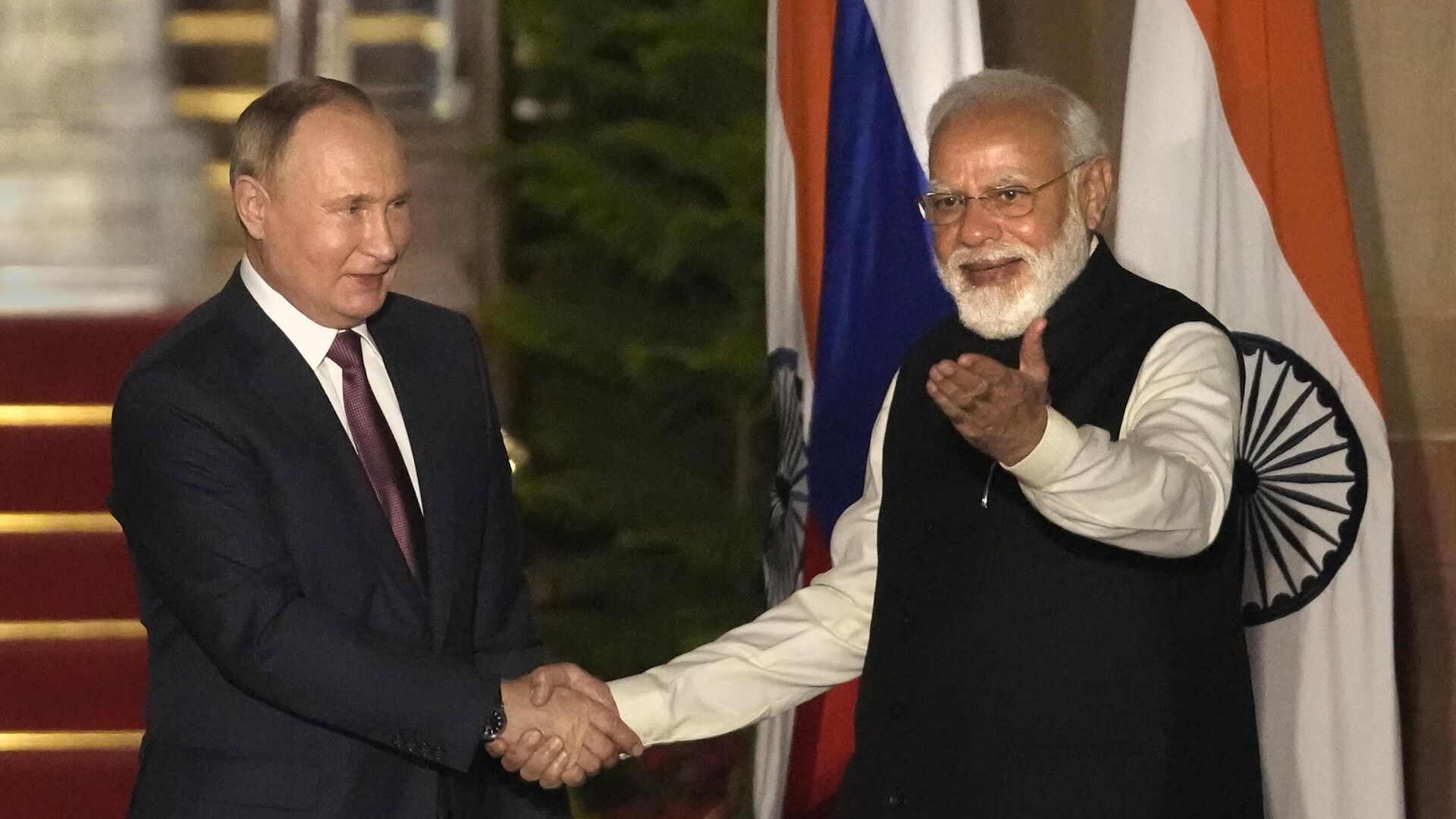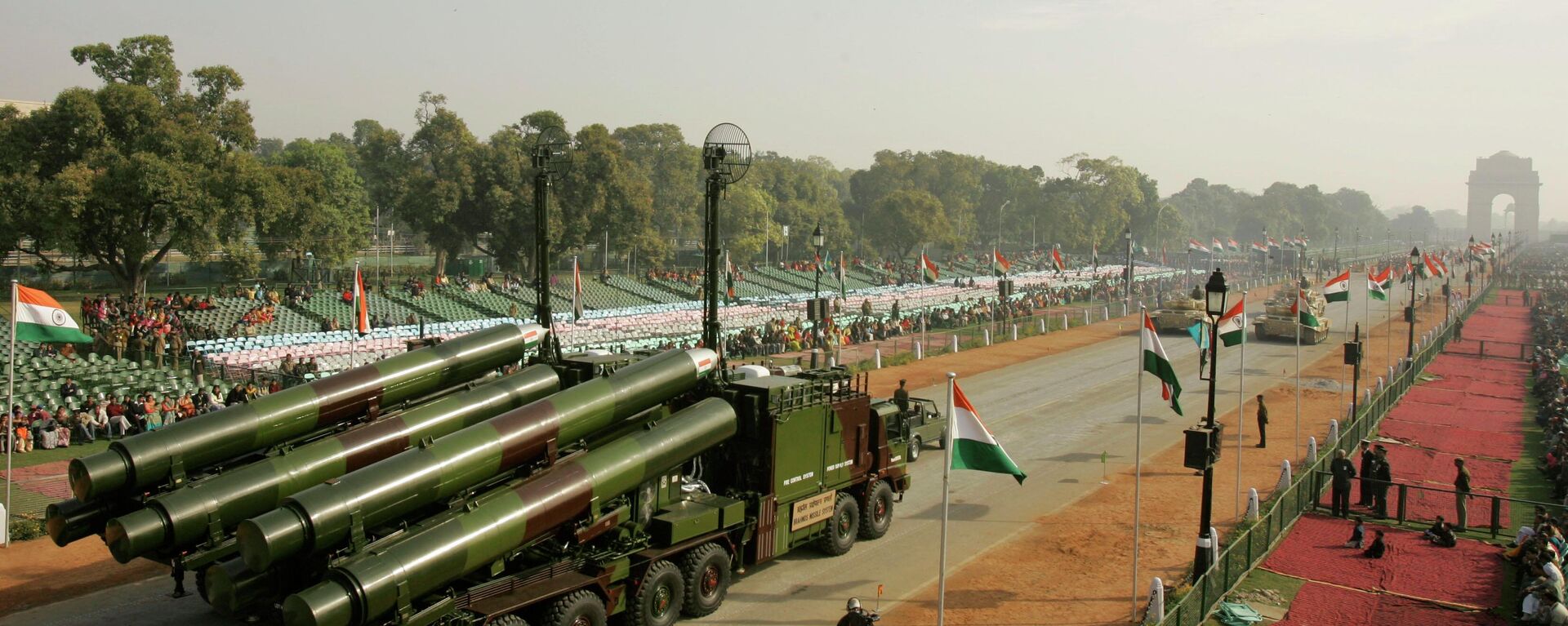https://sputniknews.in/20240622/how-new-russia-india-military-deployment-pact-to-shape-its-future-forces-7682451.html
How New Russia-India Military Deployment Pact to Shape Its Future Forces
How New Russia-India Military Deployment Pact to Shape Its Future Forces
Sputnik India
With Russia and India proving again and again their strong relationship, a recent agreement to simplify and enhance joint military operations, signals the... 22.06.2024, Sputnik India
2024-06-22T18:15+0530
2024-06-22T18:15+0530
2024-06-22T18:19+0530
indo-russian relations
mikhail mishustin
india
russia
china
ministry of defence (mod)
russian foreign ministry
us
joe biden
nato
https://cdn1.img.sputniknews.in/img/07e6/0c/17/202361_0:0:2913:1639_1920x0_80_0_0_fef53f01540e1005644bbd90083684b7.jpg
The Russian government has approved a Joint Military Deployments agreement on the procedure for mutual dispatch of military formations, warships and military aircraft of the Russian Federation and India, the relevant order was posted on the website of official publication of legal acts.The draft agreement was developed by the Ministry of Defence, coordinated with the Russian Foreign Ministry and other federal authorities, and preliminarily worked out with the Indian side.In addition, Russian Prime Minister Mikhail Mishustin instructed the Russian Defence Ministry to hold talks with India on a draft agreement on the procedure for mutual deployment of military formations.What's Behind the Agreement?He adds that this document legally formalizes the procedures necessary for such deployments, emphasizing its continuity with past agreements which are typically renewed every five years."The main update in this agreement is the inclusion of passport and visa controls for military personnel, which were previously exempt," Dr. Kupriyanov noted.Stanislav Tarasov, a political analyst specializing in the Middle East and Caucasus regions, views the agreement in the broader context of Eurasian security.Broader ImplicationsThe formalisation of this military cooperation agreement is a clear message to the international community about the strengthening Russia-India partnership.Dr. Kupriyanov echoes this sentiment, noting that the agreement "ensures smoother military logistics and enhances the overall security architecture in Eurasia."Overall, the Russia-India military deployment agreement not only strengthens bilateral defense ties but also enhances regional security dynamics, while signaling the entire world the unwavering friendship between both countries.
https://sputniknews.in/20240311/india-ranks-as-top-worldwide-arms-importer-while-deepening-ties-with-russia-6797735.html
india
russia
china
us
Sputnik India
feedback.hindi@sputniknews.com
+74956456601
MIA „Rossiya Segodnya“
2024
Sputnik India
feedback.hindi@sputniknews.com
+74956456601
MIA „Rossiya Segodnya“
News
en_IN
Sputnik India
feedback.hindi@sputniknews.com
+74956456601
MIA „Rossiya Segodnya“
Sputnik India
feedback.hindi@sputniknews.com
+74956456601
MIA „Rossiya Segodnya“
mikhail mishustin, india, russia, china, ministry of defence (mod), russian foreign ministry, us, joe biden, nato, nato expansion, nato+, multipolar world, multilateral diplomacy, mod russia, russian armed forces, indian air force (iaf), indian navy, indian army
mikhail mishustin, india, russia, china, ministry of defence (mod), russian foreign ministry, us, joe biden, nato, nato expansion, nato+, multipolar world, multilateral diplomacy, mod russia, russian armed forces, indian air force (iaf), indian navy, indian army
How New Russia-India Military Deployment Pact to Shape Its Future Forces
18:15 22.06.2024 (Updated: 18:19 22.06.2024) With Russia and India proving again and again their strong relationship, a recent agreement to simplify and enhance joint military operations, signals the continuation of this trend.
The Russian government has approved a Joint Military Deployments agreement on the procedure for mutual dispatch of military formations, warships and military aircraft of the Russian Federation and India, the relevant order was posted on the website of official publication of legal acts.
The draft agreement was developed by
the Ministry of Defence, coordinated with
the Russian Foreign Ministry and other federal authorities, and preliminarily worked out with the Indian side.
In addition, Russian Prime Minister
Mikhail Mishustin instructed the Russian Defence Ministry to hold talks with India on a draft agreement on the procedure for mutual deployment of military formations.
What's Behind the Agreement?
"The agreement aims to eliminate bureaucratic obstacles when our or Indian military assets are deployed for joint exercises or operations," Dr. Alexey Kupriyanov, Head of the Group on South Asia and Indian Ocean at the Center for Asia Pacific Studies, told Sputnik India.
He adds that this document legally formalizes the procedures necessary for such deployments, emphasizing its continuity with past agreements which are typically renewed every five years.
"The main update in this agreement is the inclusion of passport and visa controls for military personnel, which were previously exempt," Dr. Kupriyanov noted.
Stanislav Tarasov, a political analyst specializing in
the Middle East and Caucasus regions, views the agreement in the broader context of Eurasian security.
"This agreement is part of creating a pan-Eurasian security framework. It aligns with the North-South Corridor project, which involves countries like India, Pakistan, China, and Iran, among others. The project aims to enhance connectivity and economic cooperation, necessitating a unified security strategy," Tarasov told Sputnik India.
The formalisation of this military cooperation agreement is a clear message to the international community about the strengthening Russia-India partnership.
"Given the unprecedented pressure exerted on the entire world by the countries of the NATO bloc, this is a demonstration of disagreement with such actions. If the alliance between China and Russia is obvious to everyone, the confirmation of India's consent to continue co-operation and the re-signing of the agreement is also a kind of demonstration of this state's position in terms of Russia's policy," Nikolai Kostikin, an expert of the Bureau of Military-Political Analysis told Sputnik India.
Dr. Kupriyanov echoes this sentiment, noting that the agreement "ensures smoother military logistics and enhances the overall security architecture in
Eurasia."
Overall, the Russia-India military deployment agreement not only strengthens bilateral defense ties but also enhances regional security dynamics, while signaling the entire world the unwavering friendship between both countries.


